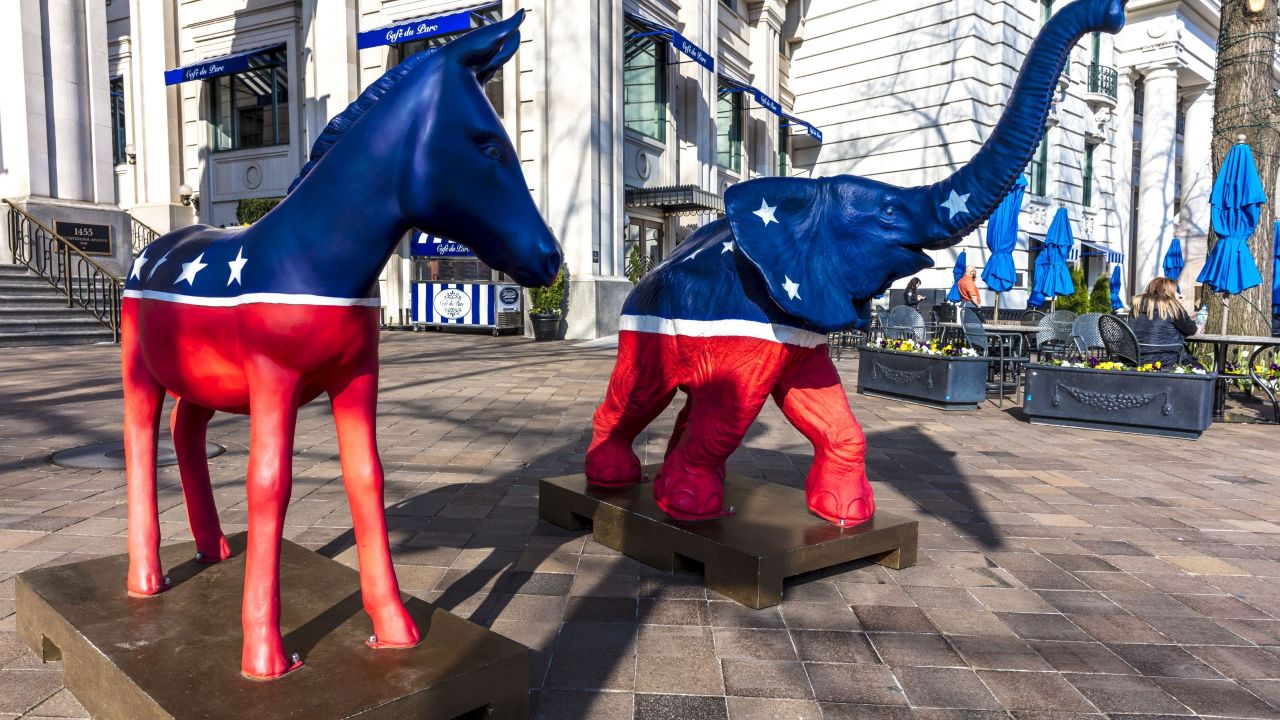
WASHINGTON DC, Democratic Mule and Republican Elephant statues symbolize American 2-part Political system in front of Willard Hotel. (Photo by: Visions of America/Universal Images Group via Getty Images)
October 23, 2020
Today the United States had at least 82,600 new cases of coronavirus, our highest daily level of cases in a single day since the pandemic started. The outbreak is widespread, meaning it will be harder to move medical personnel around to address the crisis. We have lost close to 224,000 Americans to Covid-19. As it spreads through Republican-governed states, leaders refuse to use government authority to slow its reach. “It’s not a job for government,” North Dakota Governor Doug Burgum said.
In a sign that Trump supporters see his reelection in danger, tonight on his show on the Fox News Channel, Lou Dobbs unloaded on South Carolina Senator Lindsey Graham, who is the chair of the Senate Judiciary Committee, for not doing more to help Trump. Dobbs urged South Carolinians not to vote for Graham, who is up for reelection.
Lou Dobbs is telling South Carolina residents not to vote for Lindsey Graham pic.twitter.com/vQ67BZZN6P
— Jason Campbell (@JasonSCampbell) October 23, 2020
This is ironic, since one of the goals of the very public Republican effort to ram Amy Coney Barrett through a Senate confirmation vote was to get airtime for Graham, who is in an unexpectedly tight race. Graham is faced by Democrat Jaime Harrison, who raised an eye-popping $57 million last quarter, the most any Senate candidate has ever raised in a quarter. Harrison is the first Senate candidate in history to raise and spend more than $100 million.
Harrison, Gideon, and Kelly *all* broke the previous quarterly fundraising record for a Senate race, set allllll the way back in 2018 by Beto O’Rourke https://t.co/c86o005jzd
— Gabriel Debenedetti (@gdebenedetti) October 16, 2020
Even if elected, Democratic senators will come too late to stop Barrett’s lifetime appointment to the Supreme Court. Today, senators battled over the confirmation of the 48-year-old judge, whom Trump appointed to the United States Court of Appeals for the Seventh Circuit just three years ago. Senate Minority leader Chuck Schumer (D-NY) is urging Republicans not to confirm an extremist judge less than two weeks before the election season will end. “The Republican majority is on the precipice of making a colossal and historic mistake,” Schumer said. “The damage it does to this chamber will be irrevocable.”
For his part, Senate Majority Leader Mitch McConnell (R-KY) blamed the fight over Supreme Court justices on Democrats, beginning with their 1987 opposition to Ronald Reagan’s nominee for the court, Robert Bork. This is a common complaint on the part of Republicans, although in Bork’s case, 6 Republicans joined the Democrats to oppose him—making the opposition bipartisan– and the Democrats went on to confirm Reagan’s next nominee for the seat, Justice Anthony Kennedy, after only three days of hearings. The Senate confirmed Kennedy by a unanimous vote, indicating that the problem with Bork was not Democratic partisanship, but rather the nominee.
In this case, Barrett will be the third Supreme Court justice appointed by Trump, since McConnell refused even to hold hearings for President Barack Obama’s Supreme Court nominee Judge Merrick Garland. McConnell said that holding confirmation hearings for Garland in March before an election was a disservice to voters, who should be allowed to make their wishes known in the upcoming election. If confirmed—and the Republicans have the votes to confirm her—Barrett will allow Trump to cement an originalist view of the Constitution on the Supreme Court.
Barrett’s appointment is the outcome of a longstanding attempt to overturn the active government under which we have lived since the 1930s. During the Great Depression, Democrats under President Franklin Delano Roosevelt began to use the government to regulate business, provide a basic social safety net—this is when we got Social Security—and promote infrastructure. But racist Democrats from the South balked at racial equality under this new government.
After World War II, under Chief Justice Earl Warren, a Republican appointed by President Dwight Eisenhower, and Chief Justice Warren Burger, a Republican appointed by Richard Nixon, the Supreme Court set out to make all Americans equal before the law. They tried to end segregation through the 1954 Brown v. Board of Education of Topeka, Kansas, decision prohibiting racial segregation in public schools. In 1965, they protected the right of married couples to use contraception. In 1967, they legalized interracial marriage. In 1973, with the Roe v. Wade decision, they tried to give women control over their own reproduction by legalizing abortion.
The justices based their decisions on the due process clause of the Fourteenth Amendment, passed by Congress in 1866 and ratified in 1868 in the wake of the Civil War. Congress developed this amendment after legislatures in former Confederate states passed “Black Codes” severely limiting the rights and protections for formerly enslaved people. Congress intended for the Fourteenth to enable the federal government to guarantee that African Americans had the same rights as white Americans, even in states whose legislatures wanted to keep them in a form of quasi-slavery.
Justices in the Warren and Burger courts used that same amendment to protect civil rights a century later. They argued that the Fourteenth Amendment required that the Bill of Rights apply to state governments as well as to the federal government. This is known as the “incorporation doctrine,” but the name matters less than the concept: states cannot abridge an individual’s rights, any more than the federal government can. This doctrine dramatically expanded civil rights.
But from the beginning, there was a backlash against the New Deal government by businessmen who objected to the idea of federal regulation and the bureaucracy it would require. As early as 1937, they were demanding an end to the active government and a return to the world of the 1920s, where businessmen could do as they wished, family and churches managed social welfare, and private interests profited from infrastructure projects. They gained little traction; the vast majority of Americans liked the new system.
But the expansion of civil rights under the Warren and Burger courts was a whole new kettle of fish. Opponents of the new decisions insisted that the court was engaging in “judicial activism,” taking away from voters the right to make their own decisions about how society should work. That said that justices were “legislating from the bench.” They insisted that the Constitution is limited by the views of its framers, and that the government can do nothing that is not explicitly written in that 1787 document. Faced with confusion over the exact meaning of the Constitution, some revised their position in a few ways, one of which was to rest on “textualism,” the idea that a law says exactly what it says and nothing else.
This is the foundation for today’s “originalists” like Barrett. They are trying to erase the era of legislation and legal decisions that constructed our modern nation. If the government is as limited as they say, it cannot protect the rights of minorities or women. It cannot regulate business. It cannot provide a social safety net, or promote infrastructure.
Their doctrine will send authority for civil rights back to the states to wither or thrive as different legislatures see fit, so long as their laws don’t run into textual problems, in which case the Supreme Court will step in to limit state actions.
Barrett is a darling of religious conservatives who expect her to overturn Roe v. Wade, and to undermine civil rights legislation, as the court did, for example, in the 2013 Shelby County v. Holder decision gutting the 1965 Voting Rights Act. But she also has the support of secret dark money donors. She will be the key vote to having a solid pro-corporate Supreme Court that will sharply limit what the federal government can do. Such a court can be expected to gut government regulation of business with more decisions like the 2010 Citizens United v. Federal Election Commission decision and to slash the social safety net. First up, of course, is the Affordable Care Act, about which the court will begin to hear arguments on November 10, just a week after the election.
This version of our government is not popular. Republican senators who will vote for Barrett represent 14.3 million fewer Americans than the Democratic senators who oppose her confirmation. Schumer today warned his Republican colleagues: “The majority has trampled over norms, rules, standards, honor, values, any of them that could possibly stand in its monomaniacal pursuit to put someone on the court who will take away the rights of so many Americans.”
We are pleased to be presenting daily posts from Heather Cox Richardson’s “Letters From an American” email newsletter. You can sign up to receive it in your inbox here.




